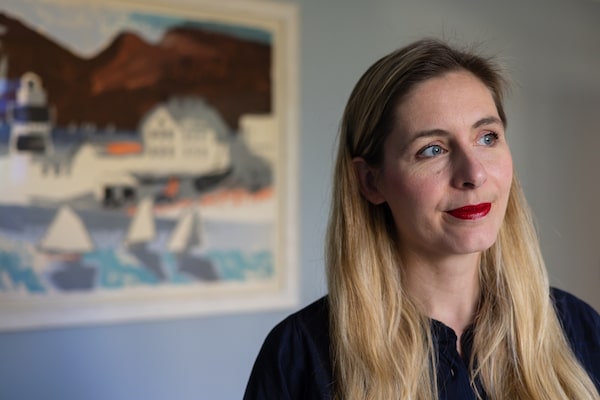Good morning, and welcome to the weekend.
Grab your cup of coffee or tea, and sit down with a selection of this week’s great reads from The Globe.
In this issue, Molly Hayes reports from Niagara Falls, an unlikely landing spot for many refugee claimants after their journey through Roxham Road, the irregular border crossing in Quebec where there has been an influx of migrants. The Ontario community has mobilized to support newcomers with the limited resources it has compared to Toronto or Montreal, Hayes said, but tensions have started to boil as the tourist town prepares for vacationers. Hayes said she wanted to “zoom way in and paint a picture” of what’s unfolding in the town, at this moment. Refugee claimants she spoke with were grateful to finally “catch their breath” after the sacrifices they made to get to Canada, but, she said, there’s also an undercurrent of frustration or angst as many anxiously wait for their work permits, for a chance to get settled.
Mark Rendell, meanwhile, looks at another big challenge in Bank of Canada’s fight against inflation: getting businesses’ aggressive pricing behaviour to a place of stability so inflation can be brought to heel.
And Nancy Macdonald profiles surfing’s teen prodigy Erin Brooks, whose gravity-defying techniques make her one to watch as she works toward the Paris 2024 Olympics.
If you’re reading this on the web, or it was forwarded to you from someone else, you can sign up for Great Reads and more than 20 other Globe newsletters on our newsletter sign-up page. If you have questions or feedback, drop us a line at greatreads@globeandmail.com.
In Niagara Falls, Roxham Road asylum seekers find less space and more strife as tourist season nears
Marie Saintil, lawyer with Niagara Community Legal Clinic, speaks with Haitian congregants, many of whom are asylum seekers, during a church service in Welland, Ont., on Feb. 26, 2023.Christopher Katsarov/The Globe and Mail
Niagara Falls has become the unexpected centre of a migration crisis in Canada, as more than 2,800 asylum seekers are unexpectedly placed in the tourist town, which is not equipped to support them. The asylum seekers, many of whom are driven to Niagara Falls from Roxham Road in Quebec, have been spread across 1,000 hotel rooms upon arrival. At first, during the height of the pandemic, and during the slow season, they were welcome guests. But now, as tourism increases, the attitude toward migrants is beginning to shift.
BoC’s inflation fight faces a new hurdle: getting businesses’ pricing power back to normal
Neal Brothers is hardly unique in raising prices more frequently, and by larger amounts, than normal.Christopher Katsarov/The Globe and Mail
When the cost of goods go up, companies have typically responded by passing a bit along to consumers, and absorbing the rest in their profit margins. But shocks to the supply chain and robust consumer demand have short-circuited price-setting behaviour over the past two years, with businesses passing a larger portion of their rising input costs to consumers, and at a more rapid pace. It’s sparked a debate over how much inflation has been driven by corporate profits, as opposed to other economic forces. For Canada’s central bank, that’s a problem. In order to get inflation under control, it’s been arguing, aggressive pricing behaviour needs to normalize.
Police oversight bodies hindered by silence of officers, Globe analysis finds
Since the death of her son, Myles Gray, in Burnaby in 2015, Margie Gray has fought for accountability from the Vancouver police who were arresting him. 'How can those officers refuse to explain what happened, and still be allowed to patrol the streets?' she asks.Rafal Gerszak/The Globe and Mail
When Canadian police kill or injure someone, they report to police oversight bodies, such as B.C.’s Independent Investigations Office. Every province, with the exception of PEI, has one. But it is unclear if these agencies, which cost a combined $25-million to run every year, are operating as designed. Officers seldom face charges or discipline and in B.C., accused police rarely co-operate with independent oversight bodies. The Globe and Mail spent months examining more than 1,000 decisions made by these agencies, to understand the extent of co-operation by accused officers. The data suggest their participation is rare, undermining the ability of communities to hold law enforcement accountable.
Russian dissidents in Poland clash as they try to plot a future without Putin
The group, called the People’s Deputies of Russia, has developed plans to hold elections for a newly formed parliament.Anna Liminowicz/The Globe and Mail
Paul Waldie sits in on a meeting of the Congress of People’s Deputies, a group of Russian dissidents in Poland, as they finalize their draft of a new Russian constitution and try to prepare for the downfall of Russian President Vladimir Putin. Part of their plans include holding elections for a newly formed parliament and proposing laws that would return all land seized in Ukraine since 2014 and offering Kyiv compensation for war damage. As united as the group is in its opposition to Putin, there was heated disagreement about what Russia would look like without the Kremlin leader.
These British manors have become modern art destinations

Chatsworth belongs to a growing group of British manor houses that have turned to contemporary art for added value.Chatsworth House Trust
The hottest exhibition this spring in Britain won’t be found at any London gallery or museum. Instead, supercurator Glenn Adamson’s paean to avant-garde design will be ensconced in the Baroque rooms of Chatsworth House, a stately 17th-century home built for the first Duke of Devonshire, and spread out across the surrounding acreage. Chatsworth belongs to a growing group of British manor houses that have turned to contemporary art for added value.
Surfing prodigy Erin Brooks pushes the sport to new heights ahead of the Olympics
Erin Brooks performs a turn while surfing Ehukai, on the North Shore of Oahu in Hawaii, Dec. 8, 2022.Melissa Renwick/The Globe and Mail
Erin Brooks has been making waves ever since, at 13, she landed a near-perfect 360-degree rotation in a surfing competition. The 15-year-old phenom is seen as a transformative figure in the sport, both for her propensity to huck giant airs, and to surf waves that have traditionally been the preserve of men. As she continues to break gender barriers in surfing, Brooks gets ready to take on the Paris Olympics, where she hopes to compete for Canada.
Opinion: Population decrease is irreversible. How will we manage the decline of humanity?

Nagoro, a village in Japan's Shikoku region, once had about 300 residents. But it was so depopulated by the 21st century that an elderly resident began making dolls to fill the empty spaces. This elementary school, shown in 2019, was closed seven years earlier because there were no more children.KAZUHIRO NOGI/AFP/Getty Images
Successive Canadian governments, both Liberal and Conservatives, have recruited immigrants aggressively to head off falling fertility rates. In Hungary, the government has greatly expanded financial supports for large families, with an eye to reversing decades of effort by women to achieve greater parity. And Sweden, as with a number of other European countries, offers strong support for women who want to have children without sacrificing their career. None of these measures might be enough, John Ibbitson and Darrell Bricker argue, and the long-term fix – ushering an era of degrowth to alter how we live – might be radical.
Eleanor Catton’s new novel Birnam Wood is a propulsive thriller sown with thorny moral questions

Author Eleanor Catton at her home in Cambridge, U.K.Betty Laura Zapata/The Globe and Mail
Michelle Cyca profiles Eleanor Catton, who is set to release her first new novel in a decade on March 7. Catton, who rose to fame with her best-selling novel The Luminaries, returns to the literary spotlight with a twisty, propulsive thriller Birnam Wood. Her latest novel tells a deeply political story about a New Zealand anarchist gardening collective seduced by an American billionaire, whose offer to fund their activities conceals his true motivations, inspired by years-long hobbies: gardening guides and plant encyclopedias.
Drawn from the Headlines
Their Hair Long and Flowing or in Ponytails, Women in Iran Flaunt Their Locks, New York Times, Feb. 25. As drawn by Hanna Barczyk for The Globe and Mail.

Illustration by HANNA BARCZYK